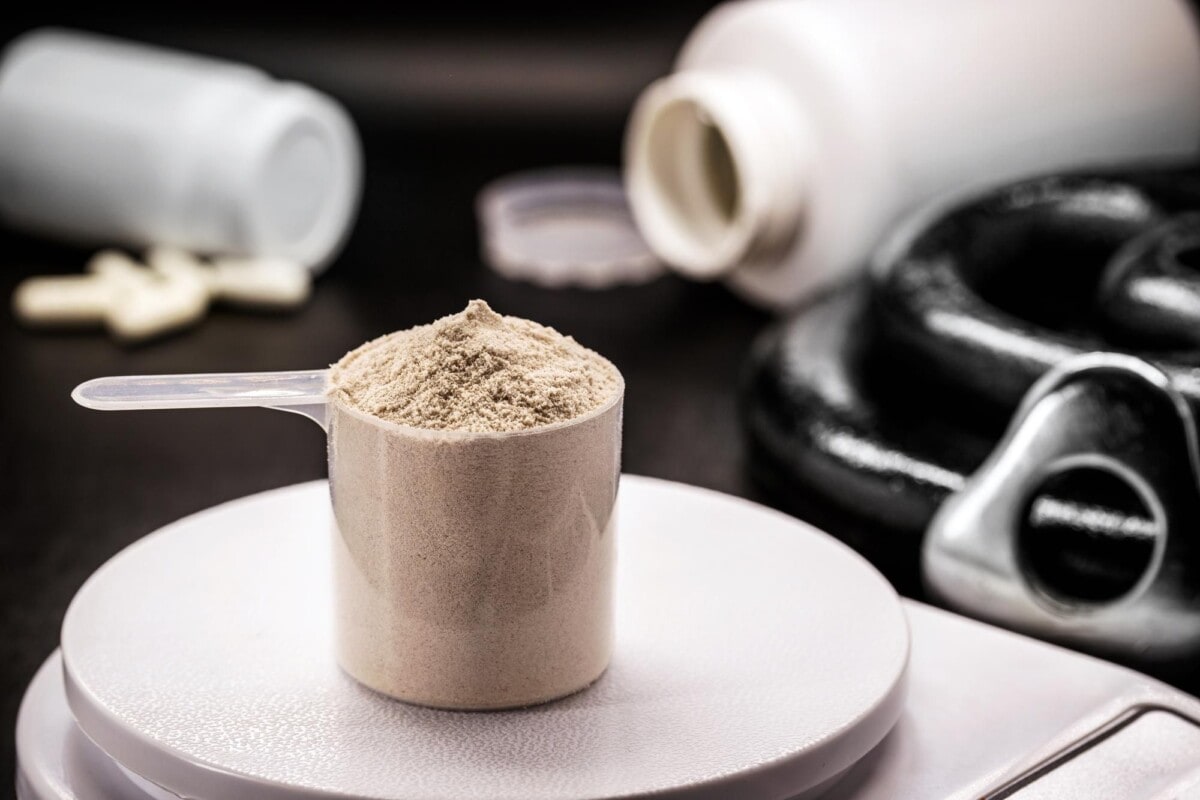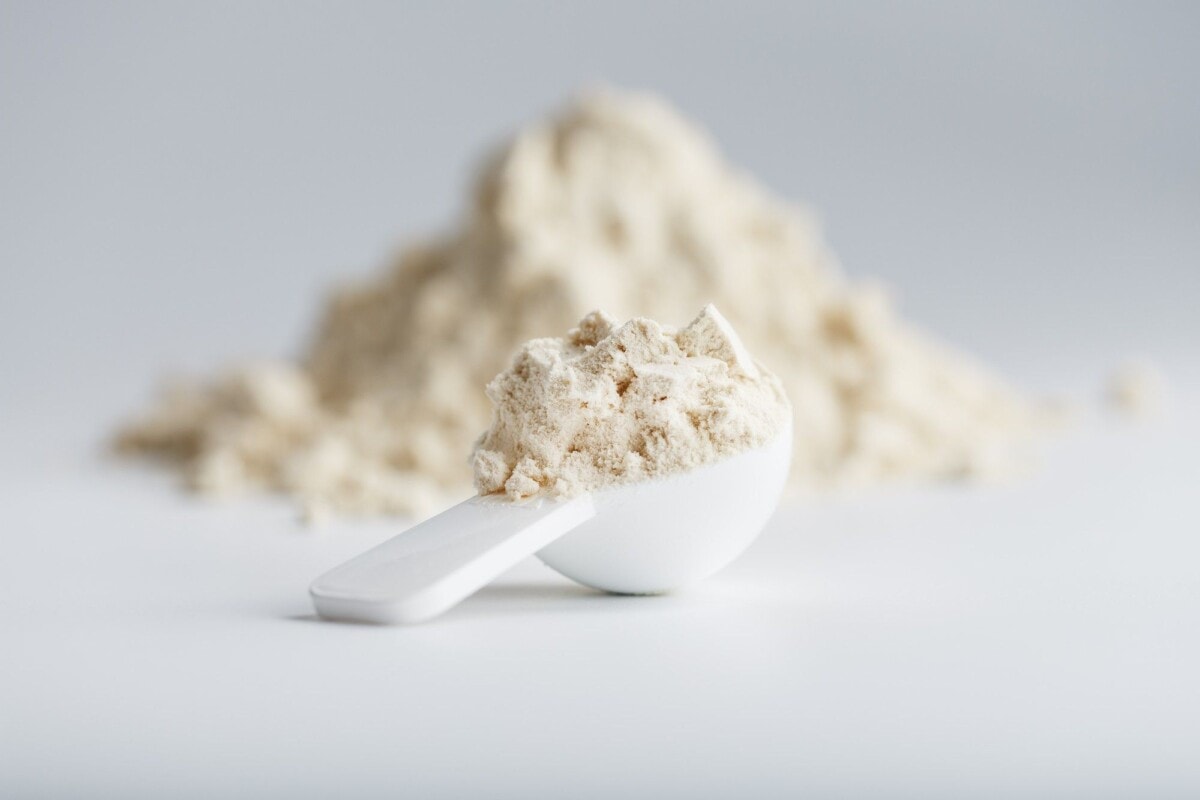Glutamina, para que serve? Como tomar, quais os benefícios e muito mais.
Se já deste uma volta por qualquer loja de suplementos desportivos, de certeza que já te cruzaste com este nome.
A Glutamina é quase um item obrigatório nas prateleiras dessas lojas, lado a lado com as proteínas e os BCAAs. Mas será que sabes o que é glutamina de verdade?
E mais importante ainda, conheces os seus benefícios, especialmente quando falamos de musculação?
Neste guia completo, vamos desvendar todos os mistérios em torno deste suplemento tão popular.
Vais ficar a saber não só o que é, mas também para que serve a Glutamina no contexto da musculação, como tomar para maximizar os seus efeitos, e quais os benefícios que podes esperar ao incluí-la no teu regime de treino.
Nota: A glutamina tem um leque amplo de aplicações e benefícios, desde a recuperação muscular até ao fortalecimento do sistema imunitário.
No entanto, neste guia, vamos focar-nos especificamente no impacto da glutamina na musculação.
So, get ready to find out everything and more about this supplement that has everyone talking!
O que é a Glutamina?
Então, vamos lá descomplicar isto: o que é a glutamina?
Basicamente, é um aminoácido que o teu corpo até consegue produzir.
Mas calma, não é bem assim tão simples.
A glutamina é o que se chama de aminoácido condicionalmente essencial.
Isto quer dizer que, em situações normais, o teu corpo dá conta do recado e produz o que precisas.
Mas em certos momentos, como quando estás sob stress extremo, como queimaduras ou doenças graves, o corpo não consegue produzir o suficiente e aí a glutamina passa a ser essencial.
In other words, you will need to obtain it in other ways.
What is glutamine used for?
Bem, este aminoácido é aquele que se encontra em maior presença nos teus músculos, de todos os aminoácidos presentes, o que já te dá uma pista dos seus benefícios.
Falando em glutamina e benefícios, um dos mais falados é exatamente o seu papel na recuperação muscular.
In other words, it really comes in handy, especially after intense leg training.
If it works, of course.

Mas onde é que a encontras?
A glutamina está presente em alimentos que provavelmente já fazem parte da tua dieta se frequentas o ginásio e segues uma alimentação rica em proteína.
Estamos a falar de carnes, ovos, peixes e outras fontes ricas em proteína.
Mas se quiseres ir mais longe, também podes optar por suplementos de L-glutamina, que é basicamente a forma mais pura e concentrada deste aminoácido.
Para quem é a Glutamina?
Este é um daqueles suplementos que, na teoria, são o máximo. Mas na prática, a coisa não é bem assim. Há quem tire partido, há quem possa tirar, e há quem nem sinta diferença.
Então, quem é que vai mesmo sentir os benefícios da Glutamina?
Se praticas desportos de resistência, como maratonas, ou se os teus treinos são intensos e muito longos, então, a Glutamina pode vir a ser útil para ti.
Este aminoácido pode vir a ajudar-te na recuperação e na manutenção da massa muscular.
E quem é que pode tirar algum proveito?
Se estás a cortar calorias para chegares ao verão em forma, a L-Glutamina pode ser útil.
Imagina que estás a fazer treinos de musculação todos os dias, ainda metes cardio na mistura e cortas ainda umas 500 calorias.
Aqui, a glutamina como pode ter benefícios a nível de recuperação e manutenção da massa magra, pode trazer benefícios.
Agora, quem é que pode passar bem sem ela?
Se já tens uma dieta muito boa, rica em proteínas de qualidade, e se os teus treinos são equilibrados, provavelmente não vais notar grande coisa.
Isto porque os teus níveis de glutamina já devem estar altos, especialmente se já tomas um suplemento de Proteína Whey ou outros suplementos proteicos.
Resumindo, a utilidade da glutamina depende muito do teu estilo de vida e dos teus objetivos de treino. Se os teus treinos são muito intensos, ou segues uma dieta muito restritiva, este aminoácido pode trazer vantagens.
Mas se já estás a fazer tudo de forma bem planeada e rigorosa, talvez não notes grande diferença.

Quais são os verdadeiros benefícios da glutamina?
Já tens uma ideia de para quem este aminoácido pode ser útil, mas agora vamos entrar nos detalhes, porque o assunto é mais complexo do que parece.
Primeiro, vamos falar de recuperação.
Se estás a dar o litro no ginásio ou a treinar para uma maratona, a glutamina pode ser benéfica na recuperação muscular.
E não é só isso, os seus benefícios incluem também uma melhor performance em desportos de longa duração.
Imagina que estás a correr uma maratona: os teus níveis deste aminoácido vão baixar e a suplementação faz todo o sentido para melhorares a tua performance e recuperação.
Agora, o efeito anti-catabólico da glutamina é outro possível benefício.
Este aminoácido pode também ajudar a preservar a tua massa muscular, mesmo quando os níveis da hormona catabólica cortisol está alto.
Mas atenção, como já deves ter percebido, a Glutamina nem sempre leva a grandes benefícios.
Se o teu treino é mais light, como 30 minutos de exercício intenso, os teus níveis de glutamina provavelmente não vão baixar muito.
Portanto, a menos que estejas numa dieta hipocalórica ou com poucas proteínas, os benefícios da glutamina podem ser mais limitados.
E o que a glutamina NÃO faz?
Bom, se estás numa dieta já bem equilibrada e com um treino bem programado, não esperes milagres.
A study compared two groups of young people between 18 and 24 years old, one taking glutamine and the other maltodextrin, and guess what?
Os resultados foram praticamente idênticos.
E mais, se estás a pensar em desportos de alta intensidade e curta duração, a glutamina provavelmente não vai fazer grande diferença.
E já que estamos a falar de suplementação, uma combinação que pode ajudar de forma significativa na recuperação é BCAA + Glutamina?
Esta combinação pode ser uma boa ajuda para quem quer maximizar a recuperação e a performance.
Glutamine, how to take it and what dose to use?
Primeiro, as melhores alturas para usares este suplemento são antes e depois do treino.
Why?
Para manteres os seus níveis sempre lá em cima e aproveitares ao máximo os seus benefícios.
Agora, quanto à dose, os valores variam.
Se estás a pensar em L-Glutamina, a forma mais comum deste aminoácido, a dose mínima recomendada é de 5g por dia.
But if you want to go further, you can take 5g before and 5g after training.

Where to buy?
A L-Glutamine from Myprotein é uma opção segura e barata.
Mas a Bulk também não fica atrás e oferece uma excelente relação qualidade/preço que encontras here.
O truque é optares por uma marca de confiança e que não te leve à falência.
Now, the big question.
A glutamina, vale a pena ou não?
Se leste o artigo todo, já deves ter uma ideia. Mas se apenas saltaste para o fim, a resposta é: depende.
Tens de dar uma vista de olhos na secção de “para quem é a glutamina” e ver onde te encaixas.
Se estás constantemente a treinar de forma muito intensa e com uma dieta hipocalórica, a resposta é possivelmente sim.
Mas se já tens uma boa alimentação e até já tomas Proteína Whey, então talvez a glutamina não faça grande diferença para ti.
Which group do you fit into?
E já agora, se tens experiência com este suplemento, qual é a tua opinião?
References http://www.ncbi.nlm.nih.gov/pubmed/11822473 http://www.ncbi.nlm.nih.gov/pubmed/18806122 http://www.ncbi.nlm.nih.gov/pubmed/17111006 http://www.ncbi.nlm.nih.gov/pubmed/11834123 http://www.ncbi.nlm.nih.gov/pubmed/9830832 http://www.ncbi.nlm.nih.gov/pubmed/10780937 http://www.ncbi.nlm.nih.gov/pubmed/10368336



